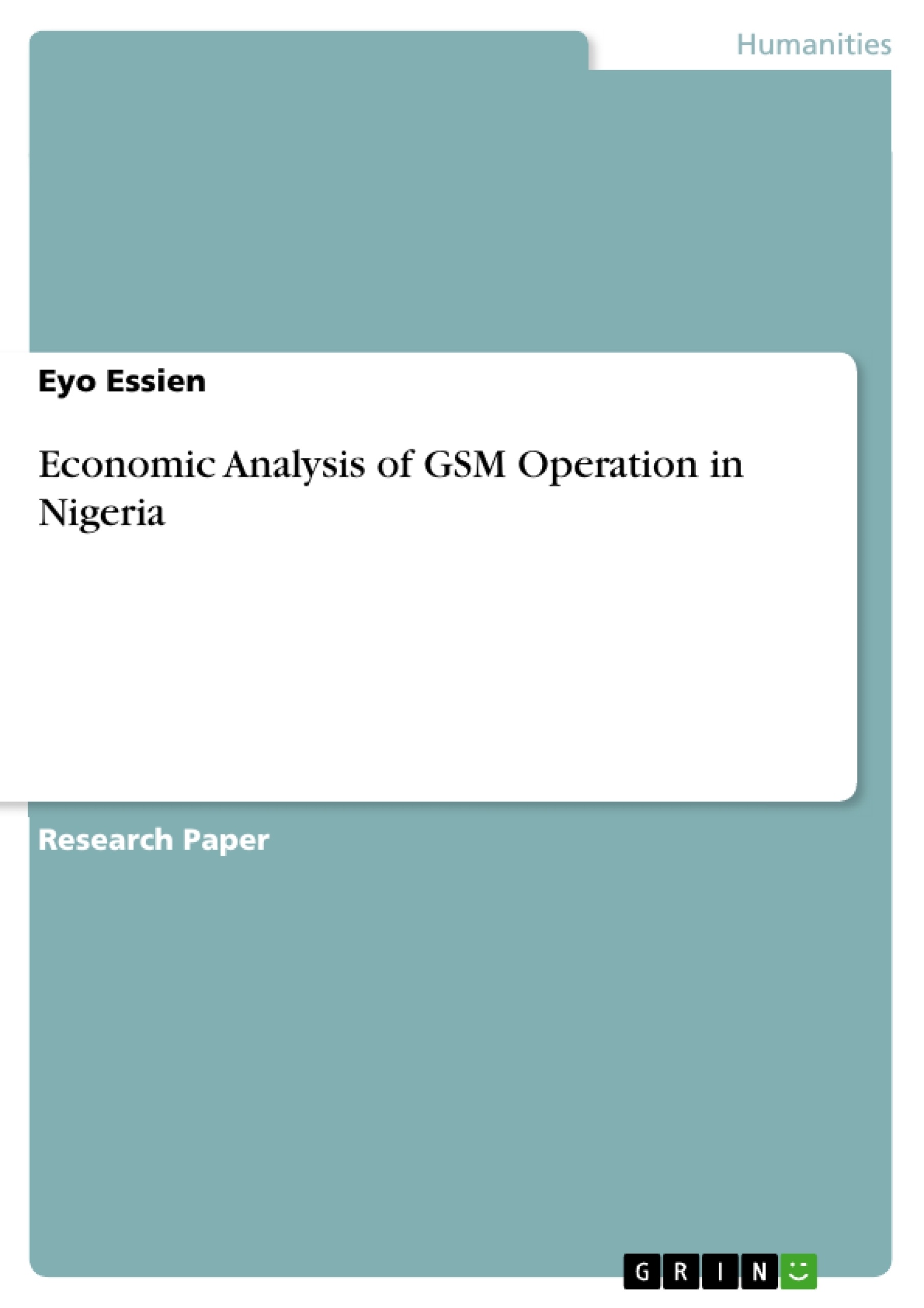Excerpt
ABSTRACT
This research carries out an economic analysis of GSM operation in Nigeria to ascertain if the Nigerian population is being exploited through excessive charges from GSM services. The setup/running cost is estimated based on the existing GSM infrastructure in Nigeria. A sample survey of subscribers, cutting across age groups, educational levels and occupational levels is carried out to determine the economic impact of GSM charges on subscribers. This was used to estimate the GSM operator’s annual revenue through different population samples sizes of 5 million through 7 million. M-script language, a derivative of C++ programming language was used to carry out the comparative analysis. Using an economic theory for profit analysis, it was seen that the GSM operator makes more than 500% profit. It was therefore concluded that the Nigerian population is being exploited by GSM operators.
Keywords: Analysis, GSM, Nigeria
INTRODUCTION
In 1960, Nigeria, with a population of 45 million, had a teledensity of 1 telephone line to 2,500 persons (Oparah, 2003). In response to the yearning of over 10 million Nigerians for access to telephone services, the Global System for Mobile Communication (GSM) standard was adopted by the Nigerian government in 2001 and four commercial companies were licensed to provide GSM services to 126,635,626 (Otuya 2003). Within 24 months of the granting of licenses, a teledensity of 1 telephone line to 39 inhabitants was achieved and Nigeria’s telecommunications sector was rated by the International Telecommunications Union (ITU), to be the fastest growing in Africa (Ashurst, 2004). By May 2005, Nigeria with an estimated population of 128,771,988 had more than 9 million GSM subscribers (a teledensity of 1 telephone to 14 persons), making the country one of the fastest growing GSM markets in the world (Ebenezar, 2005).
MOTIVATION
The great enthusiasm with which Nigerians first embraced the GSM services was soon dampened by the general perception by the subscribers of exploitation by the GSM service providers. On their own side, the GSM operators have strongly maintained that their charges have been fair. The need to determine which side is right is the motivation for this project work.
COST ANALYSIS
Structure of GSM Network
The equipments available are that of a standard GSM network divided into the following sessions:
- Network Management Centre (NMC)
- Operations Maintenance Centre Radio (OMC-R)
- Mobile Switching Centre (MSC)
- Location Registers
- Base Station System (BSS)
- Base Station Controller (BSC)
- Base Transceiver Station (BTS)
The GSM network is summarized in the following figure:
illustration not visible in this excerpt
Fig 1: GSM Network (Source: Webopedia, 2006)
From my survey, Glo Mobile GSM Nigeria currently has 34 BSCs (assume to carry 15 BTS each) and 8 MSC.
Cost of GSM Equipment
Table 1.1 Equipment cost
illustration not visible in this excerpt
* Exchange rate is fixed at N152 per $1.
Running Cost
Running cost can be divided into three:
- Human Resources
- Cost of equipment Maintenance
- Admin Centre running cost
(a) Human Resources:
The following categories of staff exist:
Table 1.2: Average Staff Earnings for a GSM operator in Nigeria.
illustration not visible in this excerpt
(b) Cost of Equipment Maintenance
Equipment Maintenance can be categorized into two
- Routine Maintenance: Routine maintenance for each network centre will cost approximately N300,000.00 a year.
Cost of yearly maintenance = 300,000 x (8 + 34 + 510) centres = N165.6m
- Consumables (diesel)
One drum of diesel per week per network centre = 1 x 552 = 552 drums.
Since 1 drum = 200 litres then 552 drums = 552 x 200 = 114,400 litres.
Calculating at N90 per litre, the cost of 114,400 litres = 114,400 x 90 = N10.296m
In a year, the running cost will be = 10.296 x 52 weeks = N535.392m
TOTAL COST PER ANNUM = N165.6m + N535.392m = N700.992m
(c) Cost of Running Admin Centres
Cost of running admin centres will be divided into two:
- Annual rents kept at N400,000. Cost per year for 37 admin centres = 37 x 400,000 = 14.8m.
- Day to day running of admin centres is kept at N300,000 per month or N3.6m per annum. For the 37 centres, the annual running cost will be = 37 x 3,600,000,000 = N133.2m
TOTAL COST PER ANNUM = N14.8m + 133.2m = N148m.
TOTAL COST
Cost of Equipment = N 51.376 billion – N96.320 billion .
Running Cost = Human Resources + Equipment Maintenance + Admin Centres
= ( 5.37334 billion – 11.0384 billion) + 700.992m + 148m
= N6.222332 billion – N11.887392 billion
If depreciation period for the equipment is 5 years,
Then
Depreciation of equipment cost incurred per year = Equipment cost / 5
= N51.376 billion/5 – N96.320 billion/5
= N10.2752 billion – N19.264 billion
Then the annual total cost = N(6.222332 billion + 10.2752 billion) – N(11.0384 billion + 19.264 billion)
= N16.497532 billion – N30.3024 billion
Monthly total cost = N1.3748 billion - N2.5252 billion
Survey of GSM Service Demand
In surveying the demand for GSM services, a questionnaire was adopted and the average weekly telephone service expenses per subscriber was processed:
Table 1.4: Average weekly telephone service expenses
illustration not visible in this excerpt
- Quote paper
- Eyo Essien (Author), 2010, Economic Analysis of GSM Operation in Nigeria, Munich, GRIN Verlag, https://www.grin.com/document/155312
Publish now - it's free






















Comments